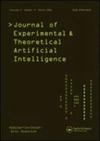Intelligent computational of Experimental Study of Intermittent Feed High-speed Grinding Method utilising PSO basis FEM Solver
IF 1.7
4区 计算机科学
Q3 COMPUTER SCIENCE, ARTIFICIAL INTELLIGENCE
Journal of Experimental & Theoretical Artificial Intelligence
Pub Date : 2022-02-09
DOI:10.1080/0952813X.2021.1960636
引用次数: 0
Abstract
ABSTRACT The high-speed grinding and polishing machine can not only significantly increase the performance of grinding but also improve the consistency of processing effectively. It is one of the most significant guidelines for the advancement of grinding technology today. Since the high-speed grinding technology has been booming these days, this study develops intermittent high-speed grinding technique for feed which has been under the basic high-speed grinding process. Using a simple list of a straight line, a piece of work can be easily retreated and fed. By affordable arrangement distance of feed-in single grinding, time of action on grinding work piece and grinding wheel has been reduced, it will affect the process of grinding heat sending that does not get fixed sate, it was decreasing grinding temperature at the time of single grinding, the surface temperature was freezer to the closed room temperature throughout the room. The lower grinding temperature was achieved according to this path. The simulation study and experiment were performed on TC4 titanium alloy materials in intermittent high-speed feed grinding, and critics of grinding elements considered grinding temperature along with grinding force have been implemented as end production using finite element analysis of the particle swarm optimization (PSO) basis.基于粒子群算法的间歇进给高速磨削实验智能计算研究
高速磨削抛光机不仅能显著提高磨削性能,还能有效提高加工一致性。它是当今磨削技术进步的最重要的指导方针之一。随着高速磨削技术的蓬勃发展,本研究对基本高速磨削工艺下的饲料进行间歇高速磨削。通过合理的单次磨削进给布置距离,减少了磨削工件和砂轮的动作时间,影响了磨削热传递过程,使磨削温度在单次磨削时得到降低,整个房间的表面温度被冷冻到封闭的室温。采用该路径可获得较低的磨削温度。对TC4钛合金材料进行了间歇高速进给磨削的仿真研究和实验,并采用基于粒子群优化(PSO)的有限元分析方法对考虑磨削温度和磨削力的磨削元件进行了最终生产。
本文章由计算机程序翻译,如有差异,请以英文原文为准。
求助全文
约1分钟内获得全文
求助全文
来源期刊
CiteScore
6.10
自引率
4.50%
发文量
89
审稿时长
>12 weeks
期刊介绍:
Journal of Experimental & Theoretical Artificial Intelligence (JETAI) is a world leading journal dedicated to publishing high quality, rigorously reviewed, original papers in artificial intelligence (AI) research.
The journal features work in all subfields of AI research and accepts both theoretical and applied research. Topics covered include, but are not limited to, the following:
• cognitive science
• games
• learning
• knowledge representation
• memory and neural system modelling
• perception
• problem-solving

 求助内容:
求助内容: 应助结果提醒方式:
应助结果提醒方式:


